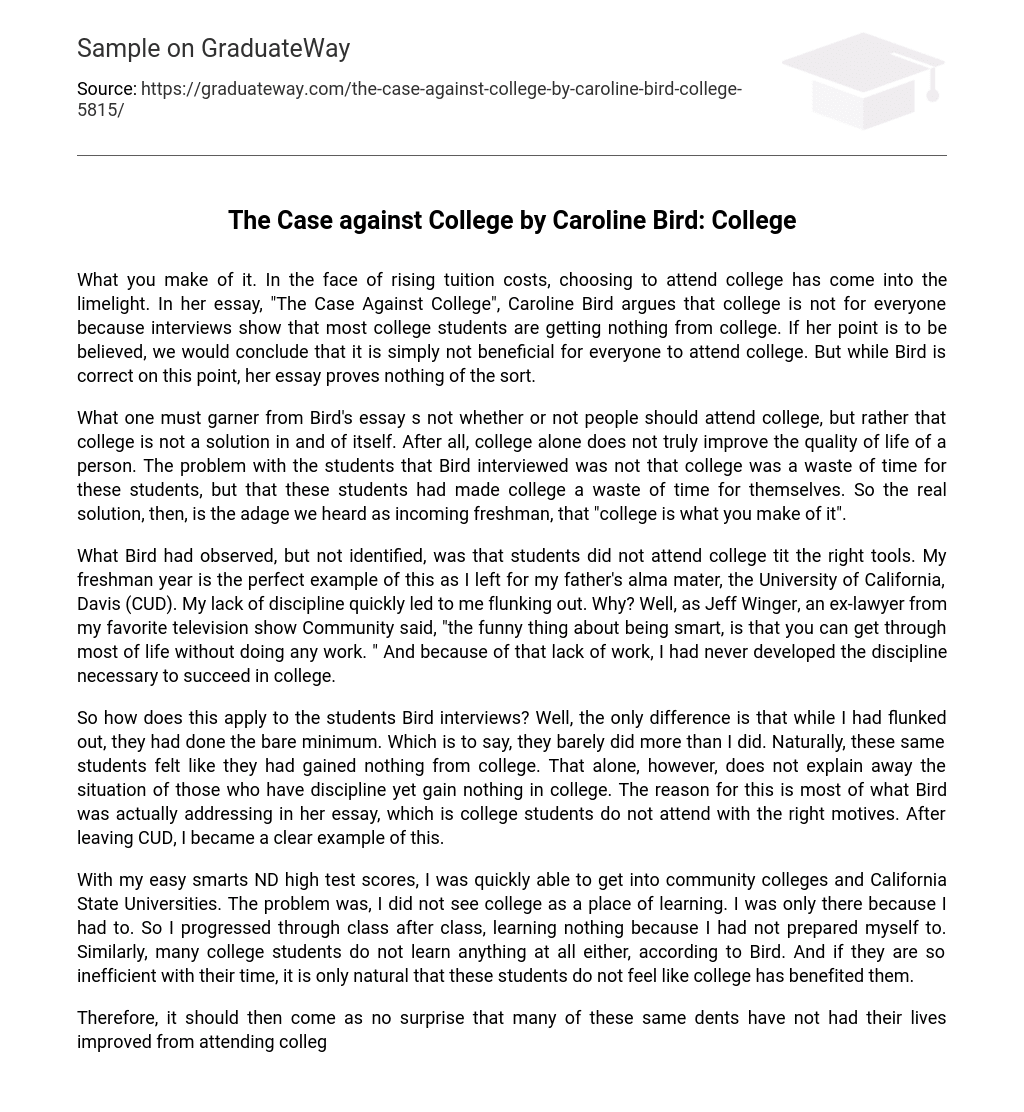What you make of it. In the face of rising tuition costs, choosing to attend college has come into the limelight. In her essay, “The Case Against College”, Caroline Bird argues that college is not for everyone because interviews show that most college students are getting nothing from college. If her point is to be believed, we would conclude that it is simply not beneficial for everyone to attend college. But while Bird is correct on this point, her essay proves nothing of the sort.
What one must garner from Bird’s essay s not whether or not people should attend college, but rather that college is not a solution in and of itself. After all, college alone does not truly improve the quality of life of a person. The problem with the students that Bird interviewed was not that college was a waste of time for these students, but that these students had made college a waste of time for themselves. So the real solution, then, is the adage we heard as incoming freshman, that “college is what you make of it”.
What Bird had observed, but not identified, was that students did not attend college tit the right tools. My freshman year is the perfect example of this as I left for my father’s alma mater, the University of California, Davis (CUD). My lack of discipline quickly led to me flunking out. Why? Well, as Jeff Winger, an ex-lawyer from my favorite television show Community said, “the funny thing about being smart, is that you can get through most of life without doing any work. ” And because of that lack of work, I had never developed the discipline necessary to succeed in college.
So how does this apply to the students Bird interviews? Well, the only difference is that while I had flunked out, they had done the bare minimum. Which is to say, they barely did more than I did. Naturally, these same students felt like they had gained nothing from college. That alone, however, does not explain away the situation of those who have discipline yet gain nothing in college. The reason for this is most of what Bird was actually addressing in her essay, which is college students do not attend with the right motives. After leaving CUD, I became a clear example of this.
With my easy smarts ND high test scores, I was quickly able to get into community colleges and California State Universities. The problem was, I did not see college as a place of learning. I was only there because I had to. So I progressed through class after class, learning nothing because I had not prepared myself to. Similarly, many college students do not learn anything at all either, according to Bird. And if they are so inefficient with their time, it is only natural that these students do not feel like college has benefited them.
Therefore, it should then come as no surprise that many of these same dents have not had their lives improved from attending college. The Case against College by Caroline Bird: College is What You Make of It By Justine-Guan student has improved his or her overall quality of life. This has been apparent to me my whole life, as I have gotten to observe the painful, yet rewarding, potential that college held for my father. He was, in my earliest memory, a Master’s candidate in Economics at CUD, and with two children and a language barrier, he had some very large mountains to cross.
Yet, he did not only Juggle his school work and his fatherly duties as best he could. Rather, he strove to squeeze the best out of both worlds. My father never shirked from being a father, but he maximized his time being a student. He took mathematics classes that he was not required to take, because not only would it strengthen his ability in economics, it would also strengthen his grasp of the English language. Eventually, because of his strong foundation in mathematics, he was able to move into a PhD program at University of California, San Diego. And from there, he was able to become a world-class professor in his field.
What he made of college left an indelible footprint in my life and holds the key for the same students who struggled in college. If college is merely a chore that needs to be done, then all we get at the end is that paper that affirms the chore has been completed. However, if college is truly a place of learning, then it provides endless opportunities of growth, Just like it did for my father. Of course, I did not learn my lesson immediately and according to Bird, many students never do. In my life, the lack of discipline and focus pushed me as far away from graduating as one could be.
In the lives of the graduating students that Bird describes, their lack of discipline and focus left them with nothing more than a piece of paper. Either way, we are all still ill-equipped to handle the “real world”. In the terms of that world, education’s potential plays a large role in economic gain. Thus, those who maximize that time in college also become more sought after commodities. The opportunity cost is simply too high to waste the time we spend at college. Should we be a student from Bird’s interviews or a student like my father? Well, college is what we make of it.





